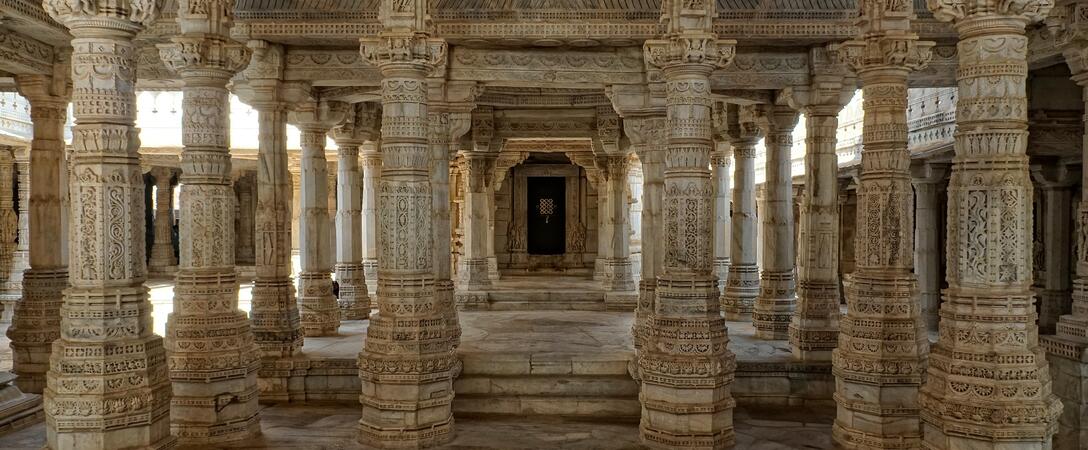In addition to this sampling, you can view a YouTube playlist of Jainism and Ecology videos here.
Multimedia
On April 22nd—celebrated as Earth Day—communities around the world call particular attention to the imperative to protect the environment and all living organisms. This program explores Jain principles and actions associated with the vratas or vows that govern pious conduct and considers how these might serve as models for safeguarding the ecosystem and promoting food security, animal rights, and healthy diets. Deriving from the Sanskrit word jina, meaning “a victor” over worldly attachments, Jainism is an ancient Indian way of life that emphasizes nonviolence, non-possessiveness, and acceptance of multiple perspectives. Our panelists will highlight Jain philosophical approaches that prioritize reducing harm to living things, including plants and animals, and they will offer invaluable insights into the links between animal welfare, pollution, education, and public health.
A webinar hosted by Applied Jainism & conceptualized by Dr. Bipin Joshi. Climate Crisis is a bigger problem than what we perceive. Although plastic is very useful in our lives and we apparently can't do without them, they have a great contribution to #climatechange through wildlife deaths, environmental pollution and human health hazards.
Professor Jain highlights the long relationship between Jainism and sound ecological practice, including the use of ‘muhapatti’ or masks, non-violence, veganism, and mindfulness. Moderated by Pranav Kothari.
This week, Spotlights features a clip from our episode with Dr. Pankaj Jain, Head of the Department of Humanities & Languages and Chair of The India Centre at FLAME University. We talk about the place of animals in Indian religion, culture, and ecology, including questions about vegetarianism, veganism, agriculture, and animal sanctuaries. Details for the full episode are available here.
This week's episode of Spotlights features Pankaj Jain, PhD, an internationally recognized academic leader in sustainability, Jain studies, film studies, and diaspora studies. He is the Head of the Department of Humanities & Languages and Chair of The India Centre at FLAME University. We discuss connections between dharma and ecology in Hinduism and Jainism, with particular attention to three books by Dr. Jain, Dharma and Ecology of Hindu Communities: Sustenance and Sustainability (Routledge, 2011), Science and Socio-Religious Revolution in India: Moving the Mountains (Routledge, 2016), and Dharma in America: A Short History of Hindu-Jain Diaspora (Routledge, 2019). He tweets at @ProfPankajJain, and his podcast #DiscoverIndia is on Spotify, Apple, Google, YouTube, Gaana, and other platforms. You can also find more information at his faculty website.
In an interactive talk, Prof. Pankaj Jain discusses dharmic ecology and how Jain cosmology can inform modern action for healing the Earth.
This episode features Christopher Key Chapple, PhD, Doshi Professor of Indic and Comparative Theology and founding Director of the Master of Arts in Yoga Studies at Loyola Marymount University in Los Angeles. He shares his perspective as a scholar and practitioner of yoga, particularly with regard to the connections between yoga and ecology. He discusses his new book, which explores elemental meditations across different traditions of yoga, Living Landscapes: Meditations on the Elements in Hindu, Buddhist, and Jain Yogas (SUNY Press, 2020). More information about the book can be found here. You can find more information about Hindu, Buddhist, and Jain perspectives on ecology at the Forum Website.
How can religion be used to fight against Climate change? This declaration gives direction to the Jains to change their lifestyles in order to live sustainably. Guest speakers: Dr. J. Jina Shah and Sudhanshu Jain.
Vivek Maru, founder of Namati, describes the efforts of people directly affected by environmental destruction—small hold farmers in Sierra Leone, fisher people on the coast of India, families in an industrial zone of Baltimore—to exercise their rights. He weaves a story about how these struggles are connected to each other, to Jain philosophy, and to the future of the planet. Vivek also maps out concrete ways each one of us can advance environmental justice.
Cofounder of Schumacher College, editor of Resurgence magazine, and global activist Satish Kumar discusses how his Jain philosophy of nonviolence leads him to live as a pilgrim rather than as a commuter, and ultimately to find fellowship with all life.
Christopher Chapple discusses Jainism and Ecology with Mary Evelyn Tucker.
Watch the whole “Conversations on World Religions and Ecology” series on the Forum on Religion and Ecology YouTube Channel.
Three scholars of South Asian religions suggest ways in which those traditions might respond to Journey of the Universe. Dr. David Haberman, Professor of Religious Studies at Indiana University Bloomington, draws parallels with Hindu creation myths of the One becoming the many, suggesting that all of reality is interconnected and arising from the same source. Dr. Christopher Ives, Professor and Chair of Religious Studies at Stonehill College, suggests that Buddhism teaches people to move beyond egocentricity to realize that one affects and is affected by everything else, which resonates with Journey’s notion of interdependent communities. Dr. Christopher Chapple, Professor of Indic and Comparative Theology at Loyola Marymount University, appeals to the structure of Jain temples to convey insights about the connection between the human body and the cosmos, the purification of consciousness, and the recovery of intimacy with life in its many forms. This panel was part of the June 2013 Journey of the Universe and Our Elegant Universe Symposium.
Dr. Pankaj Jain discusses the rich ecological dimensions of Jain tradition grounded in the principles of nonviolence (ahimsa), non-attachment to worldly possessions (aparigraha), and the reality of plurality in ways of being and knowing (anekanta). Dr. Jain also connects these philosophies to practices such as nonviolent activism, vegetarianism, abstinence, and the avoidance of extractive industries.
See Part 1 for description.
Header photo: Dilwara Jain Temples, Mount Abu, Rajasthan, India

